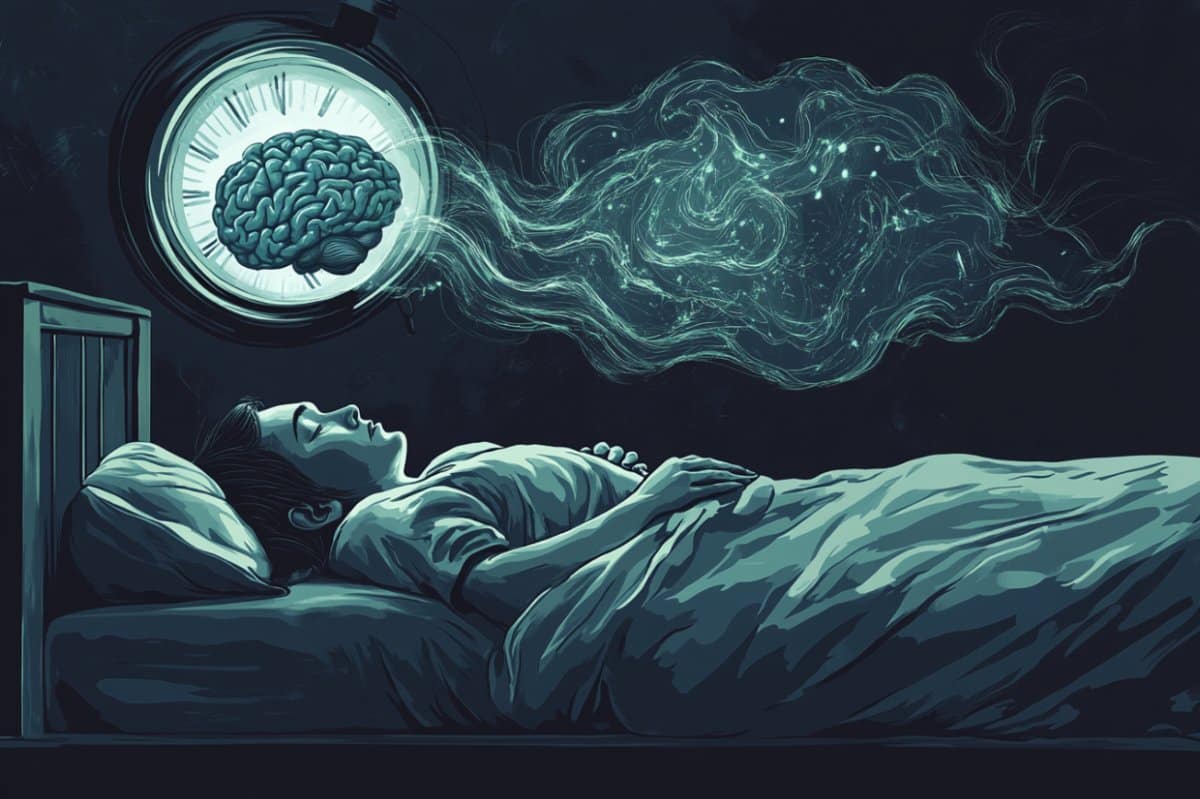Summary: Sleeping more than nine hours a night may be detrimental to brain health, particularly for individuals experiencing symptoms of depression, according to a new study. Researchers analyzed data from nearly 2,000 dementia-free adults and found that long sleep duration was associated with worse performance in memory, visuospatial ability, and executive function.
These effects were significantly stronger in people with depression, regardless of whether they were on antidepressants. The study suggests that sleep is a modifiable risk factor for cognitive decline and highlights the need to personalize sleep recommendations based on mental health status.
Key Facts:
- Cognitive Risk: Long sleep (>9 hours) was linked to poorer cognition, especially in memory and executive function.
- Depression Link: Effects were strongest in people with depressive symptoms, with or without antidepressant use.
- Modifiable Factor: Sleep duration may be a changeable risk factor for cognitive decline in vulnerable populations.
Source: UT San Antonio
There might be such a thing as getting too much of a good night’s sleep.
Sleeping nine hours or more per night is associated with worse cognitive performance, which is even more the case for those with depression, a study led by researchers at The University of Texas Health Science Center (UT Health San Antonio) shows.

They derived the results from an examination of sleep duration and cognition in 1,853 dementia-and-stroke-free participants in the Framingham Heart Study, which is an ongoing community-based cohort study of residents in Framingham, Massachusetts, under the direction of the National Heart, Lung, and Blood Institute of the National Institutes of Health. This latest examination focused on those ages 27 to 85 with a mean age of 49.8 years.
“Also, long-sleepers were more likely to report symptoms of depression,” said Vanessa Young, MS, clinical research project manager at the Glenn Biggs Institute for Alzheimer’s and Neurodegenerative Diseases at UT Health San Antonio.
“Sleep may be a modifiable risk for cognitive decline in people with depression.”
Young, who also is with the Translational Science PhD program in the Graduate School of Biomedical Sciences at UT Health San Antonio, is first author of the study titled, “Long sleep duration, cognitive performance, and the moderating role of depression: A cross-sectional analysis in the Framingham Heart Study,” published April 21 in Alzheimer’s & Dementia.
Authors also represent Arizona State University; the Framingham Heart Study; Hôpital du Sacré-Coeur de Montréal; University of Montreal; Boston University; and Monash University, Australia.
“Long but not short sleep duration was associated with poorer global cognition and specific cognitive abilities like memory, visuospatial skills and executive functions,” said Sudha Seshadri, founding director of the Biggs Institute and senior author of the study. “These associations were stronger in people with depressive symptoms, regardless of antidepressant usage.”
Sleep and brain health
According to the study, there is increasing recognition of the significance of sleep as a vital physiological process for brain health. Disturbances in sleep duration and patterns have been observed across lifespans and are present in both normal and pathological aging.
These disturbances contribute to an increased risk of cognitive deficits and Alzheimer’s disease. The Global Council on Brain Health recommends 7 to 8 hours of nightly sleep for adults to preserve brain health.
Several studies have suggested that both excessive and insufficient sleep relative to the prescribed duration are linked to impairments in cognitive domains, including memory, attention and the ability to manage and direct other mental processes, such as planning, problem-solving and controlling impulses.
However, evidence has been marked by inconsistencies depending on the lifespan being examined, and on health differences such as depression. Depression, a modifiable risk factor for cognitive decline, often co-occurs with sleep disorders.
The association between sleep disorders and depression is well established, with about 90% of people with depression reporting problems with sleep, the study notes.
In the new research, the scientists investigated whether depression modified the associations between sleep duration and cognitive performance.
The Framingham participants were categorized into four groups: no depressive symptoms, no antidepressants; depressive symptoms without antidepressant use; antidepressant use without depressive symptoms; and depressive symptoms and antidepressant use.
They found that long sleep was associated with reduced overall cognitive function, with the strongest effects in those with depressive symptoms using and not using antidepressants.
Weaker but significant effects were observed in those without depressive symptoms. No significant associations were observed in participants using antidepressants without depressive symptoms.
With that, they concluded that associations between sleep duration and cognitive performance are strongest in individuals with depressive symptoms, regardless of antidepressant use.
“Future longitudinal studies including large-scale, multi-modal approaches are needed to further elucidate the temporal relationship between sleep disturbances and cognitive changes,” the researchers said in their conclusion.
About this sleep and cognition research news
Author: Steven Lee
Source: UT San Antonio
Contact: Steven Lee – UT San Antonio
Image: The image is credited to Neuroscience News
Original Research: Open access.
“Long sleep duration, cognitive performance, and the moderating role of depression: A cross-sectional analysis in the Framingham Heart Study” by Vanessa Young et al. Alzheimer’s & Dementia
Abstract
Long sleep duration, cognitive performance, and the moderating role of depression: A cross-sectional analysis in the Framingham Heart Study
INTRODUCTION
We investigated whether depression modified the associations between sleep duration and cognitive performance.
METHODS
We examined the associations between sleep duration and cognition in 1853 dementia-and-stroke-free participants (mean age 49.8 years, [range 27–85]; 42.7% male). Participants were categorized into four groups: no depressive symptoms, no antidepressants; depressive symptoms without antidepressant use; antidepressant use without depressive symptoms; and depressive symptoms and antidepressant use.
RESULTS
Long sleep was associated with reduced overall cognitive function (β ± standard error = −0.25 ± 0.07, p < 0.001), with strongest effects in those with depressive symptoms using (−0.74 ± 0.30, p = 0.017) and not using antidepressants (−0.60 ± 0.26, p = 0.024). Weaker but significant effects were observed in those without depressive symptoms (−0.18 ± 0.09, p = 0.044). No significant associations were observed in participants using antidepressants without depressive symptoms.
DISCUSSION
Associations between sleep duration and cognitive performance are strongest in individuals with depressive symptoms, regardless of antidepressant use. Future research should elucidate underlying mechanisms and temporal relationships.







